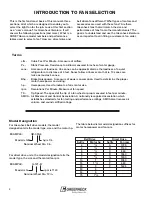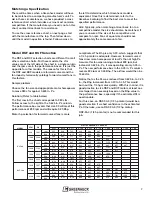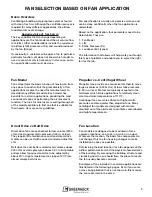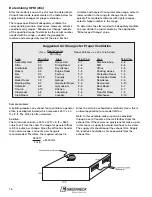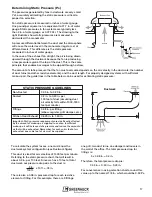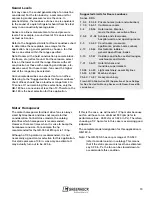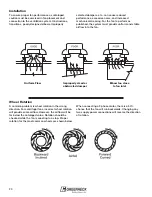
Model
Common Accessories
Roof Curb
G & GB
Backdraft Damper
Roof Curb
CUBE
Grease Trap
SB
Wall Mount Housing or
Wall Mount Collar
Model
Common Accessories
Speed Control
SP & CSP
Discharge Vents
Backdraft Damper
SQ & BSQ
Vibration Isolators
One advantage of choosing the GB-101-4-R2 over the
GB-101-4-R1 is that it is capable of running at higher
rpm’s, which enables the fan to move more air if
necessary.
Motor pulleys are adjusted by loosening the set screw
and turning the top half of the pulley (see illustrations at
right). This causes the pulley diameter to change, which
results in changing the fan rpm.
Direct Drive Selection
Selection of direct drive fans (those with the motor shaft
connected to the fan wheel or propeller) is nearly the
same as belt drive selection. However, there are two
differences worth noting. Where belt drive fan speed
can be altered by adjusting the motor pulley, direct
drive fans (since they have no pulleys) must use a
different method.
1. To adjust a direct drive fan's speed (also motor
speed) or to provide a means of meeting an exact
performance requirement, a speed control can be
furnished. Speed controls vary the voltage supplied
to the fan and slows it down; a principle similar to
the way dimmer light switches work.
2. Models CUE and CW, sizes 060-095 and Model SQ,
sizes 60-95, are provided with 115 volt, 60 cycle
motors. The three speeds are 1550 rpm (D), 1300
rpm (G) and 1050 rpm (E). Changing a motor lead is
all that is necessary to change speeds. When
selecting a model with 3 speed motors, it is
recommended that the G speed be chosen whenever
possible. This is the middle speed, which gives the
greatest flexibility in air volume because airflow can
be increased or decreased simply by changing a
motor lead.
Motor Information (Belt Drive Only)
When specifying a belt drive fan, the model designation
does not completely describe the unit. Additional
information about the motor is necessary. These items
are listed below:
Motor Enclosure
This will be either “Open” (open, drip proof), “TE”
(totally enclosed) or “EXP” (explosion resistant). Open
is the most common and will be supplied unless
otherwise specified.
Speeds
Motors are available in either single speed or two
speed. Single speed motors are 1725 rpm. Two speed
motors will be 1725/1140 rpm. Single speed will be
supplied unless otherwise specified.
Electrical Characteristics
Voltage and phase. Voltage can be 115, 208, 230 or
460. Phase is either single or 3 phase. A 115 volt, single
phase motor is shown as 115/1. Typically, motors of
1/2 hp and less are single phase. Motors of 3/4 hp and
greater are 3 phase.
Accessories
Most fans are ordered with accessories. Here are some common accessories for selected models:
6
Opening the pulley decreases fan rpm.
Closing the pulley increases fan rpm.
Belt
Typical Motor Tag
Electrical Instructions
Suffix Letter
Motor Speed
Wiring Connections
D
1550 rpm
White to L1 Black to L2
G
1300 rpm
White to L1 Blue to L2
E
1050 rpm
White to L1 Red to L2




